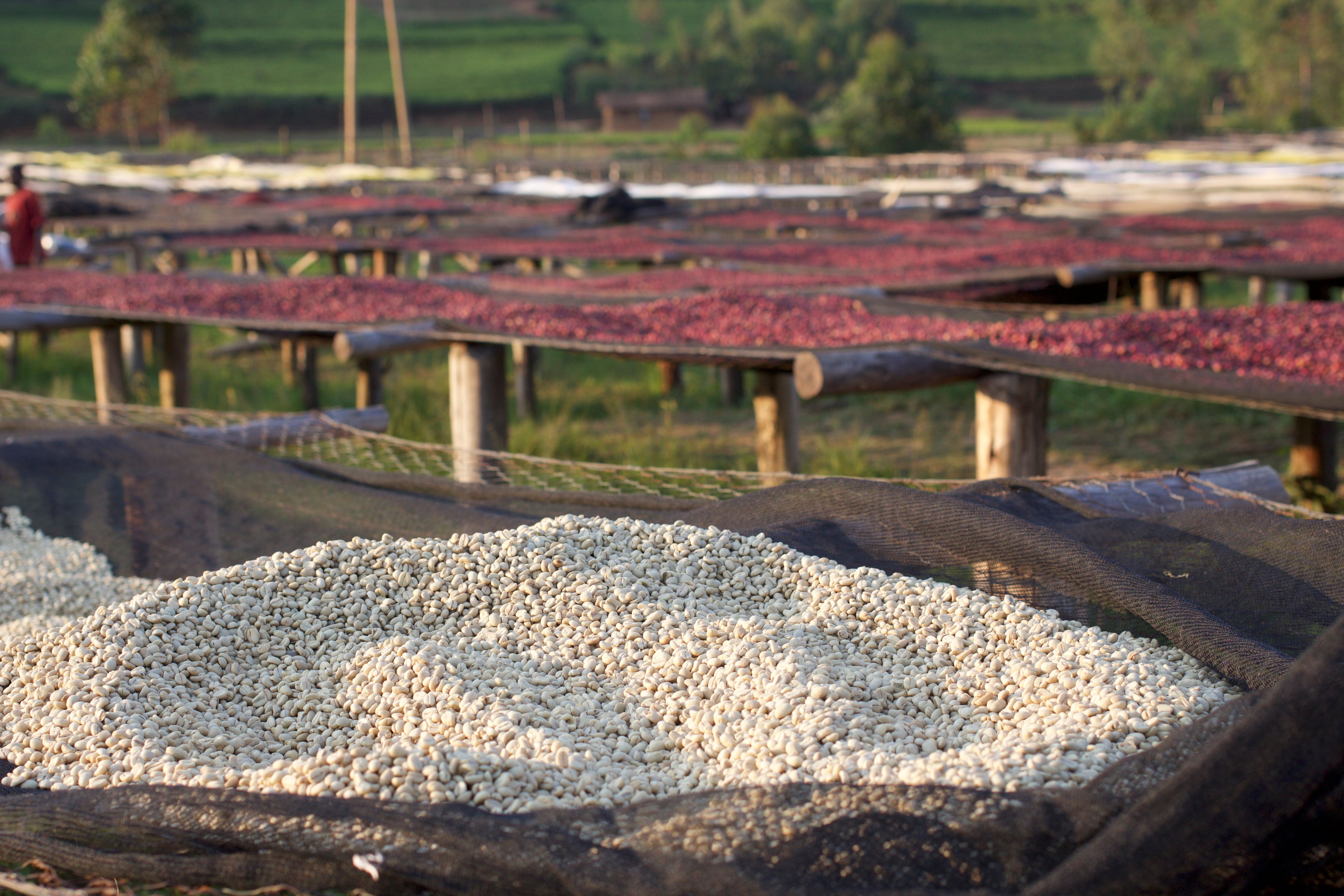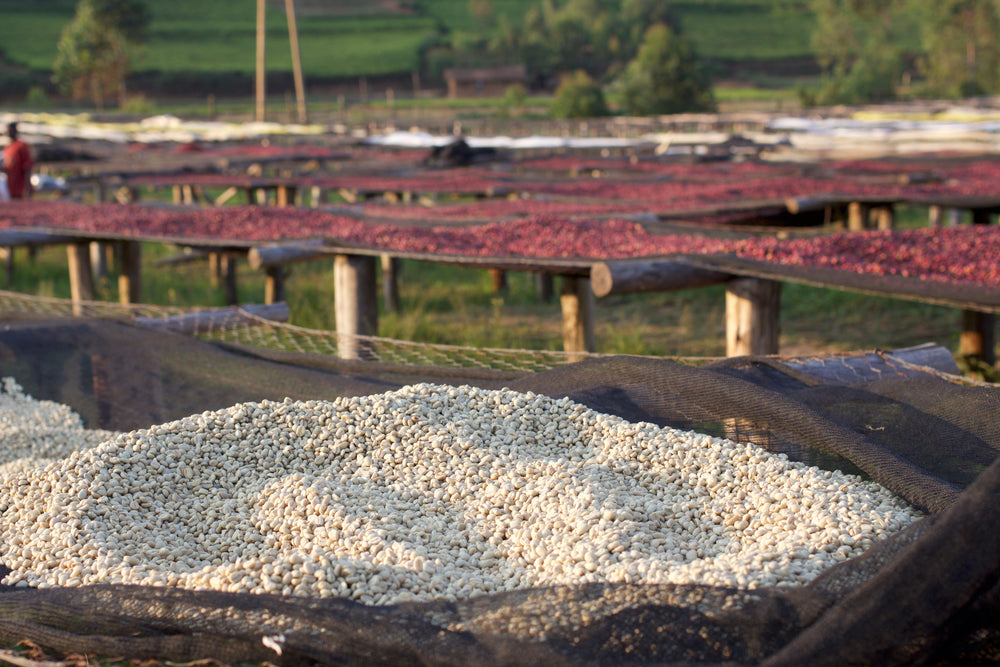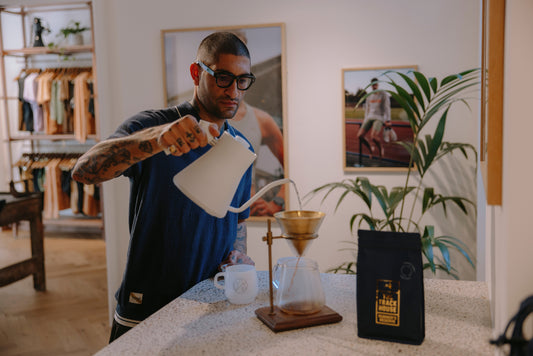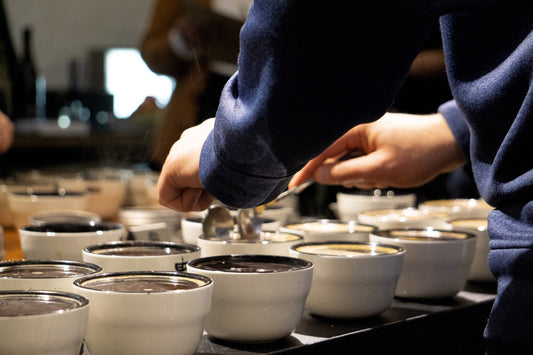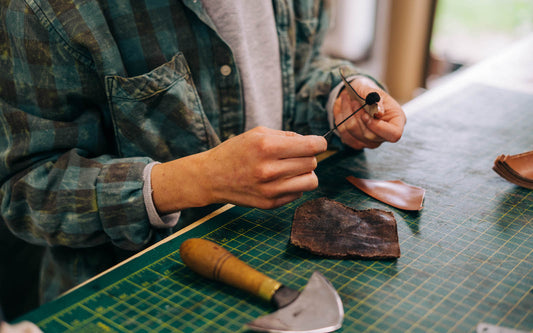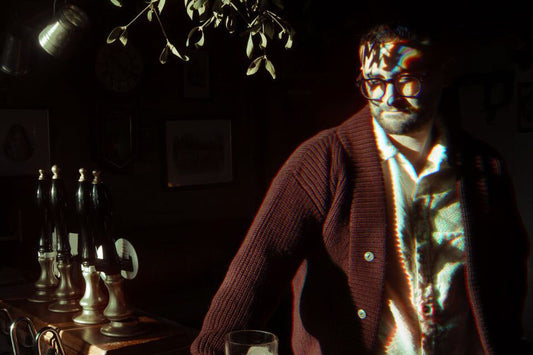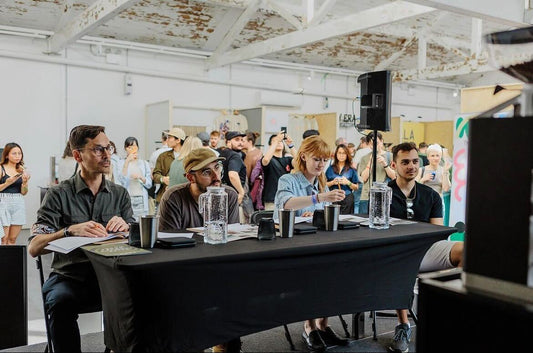The first snowflakes of the year have begun to fall in London, with more settling across the rest of the UK. It literally seems a world away from where we were 5 months ago, visiting Rwanda and Burundi to find delicious coffees to get us through these cold winter months.
To share some of our excitement around the imminent release of these awesome coffees we'd like to tell a few stories of the people that made our trip so memorable.
 Villagers at the Buziraguhindwa washing station in Kayanza, Burundi.
Villagers at the Buziraguhindwa washing station in Kayanza, Burundi.
We arrived back in Rwanda at the end of June and headed straight to RTC (Rwanda Trading Company) to cup through table after table of freshly harvested lots of coffee. Those who've been following Workshop's story for the past few years may remember coffees like Gitesi and Mahembe, who are working with RTC. A great place to start our travels, we sat down with managing director Clay Parker to get a field report on how the 2017 harvest was faring. New zoning regulations, as well as a mandatory price increase for coffee cherry meant that a lot of coffee washing stations were struggling to purchase cherry, and were running out of money within the first three weeks of harvest. RTC have reworked a lot of their contracts so that stations are still rewarded for producing quality through higher payments up front rather than the system traditionally opted for which provides a secondary payment later in the year. Unfortunately, along with the second payment comes agricultural and financial advice, which will now be lost.
Gitesi and Mahembe however continue to operate at very high levels so will still get a secondary payment. There are also safety nets, for instance Gitesi station got their Rainforest Alliance certification through. This isn't necessary when selling high quality microlots as buyers are paying premiums for the flavour, but if they produce lots scoring under 85 points they will still have access to market premiums afforded by the RA.
Here is Regina roasting samples at RTC's cupping lab in Kigali.
After cupping at RTC we visited Sam Muhirwa, along with his brother Luis and mother Ephiphanie at Buf Coffee. Again, we've worked with coffees from Buf every year since 2012.
 Cupping with Uziel at Buf's lab.
Cupping with Uziel at Buf's lab.
The new pricing regulations haven't really affected Sam, as he is already paying high premiums for the best coffee cherries. However, the zoning laws that restrict coffee washing stations buying from producers outside of a certain territory, means he is unable to continue buying from certain smallholders with whom he has been working for years.
In Kigoma, so that Sam is able to continue buying from these discerning farmers, he has built a new station called Umurage (which translates to 'Heritage') meaning relationships are maintained and he can continue to pay Buf prices for great coffee cherries. Angelique is the washing station manager, and they are building a warehouse on site as well as tiled fermentation tanks. Sam's dream is to plant the surrounding area with coffee trees.
Sam has also bought a station just south of Kigali called Ubumwe (which translates as 'Unity') from which we tasted some excellent coffees! Ever the optimist, when we asked Sam if we could spend our final day in Rwanda on the road visiting his old and new stations he replied "That is very feasible!" Buf's stations are primarily in the South of Rwanda, in Huye and Nyamagabe, but they are also involved with the Kivu Belt Group who are growing coffees in the western province of Nyamasheke.
At Nyarusiza station we saw a little of his newly planted farm, with 5,000 or so coffee trees, as well as meeting the new station manager Celeste. Edwina who was in charge when we last visited is now working at Ubumwe, and Celeste who has been working at the Nyarusiza station since the very beginning, is very proud of his recent promotion and was really excited to meet us and take us through all the quality control measures in place during coffee processing and drying.
 Celeste, the new station manager at Nyarusiza.
Celeste, the new station manager at Nyarusiza.
Visiting Remera station was also exciting, as Sam has built a huge covered drying area with multi-tiered raised beds, so that he is able to dry very premium lots of coffee under shade. These will likely be day lots from single collection points, such as Miko, Gataba or Kirehe.
 Sam Muhirwa: "This is very feasible." Sam's favourite drink is orange fanta, even though he says it is typically for children, he doesn't care.
Sam Muhirwa: "This is very feasible." Sam's favourite drink is orange fanta, even though he says it is typically for children, he doesn't care.
Sam's pioneering attitude doesn't just apply to coffee. The surrounding hillsides grow macadamias and eucalyptus, and he was talking about plans to distill eucalyptus essential oils as another source of income. They also bought a small pulper to mash cassava root, intending to use the fermentation tanks at the washing station to ferment the mash, but there was an issue with the flavour lingering in the tanks, so to avoid spoiling the coffee production this project was halted.
---
After a whilrwind tour of Rwanda, our trusted driver Roger Nyonshuti took us to the Burundian border. There we met up with Salum Ramadhan, with whom we've exclusively been working to buy our Burundian coffees. He owns the Sehe, Cukiro, Buziraguhindwa and Mbirizi washing stations, and is experimenting with honey processing and naturals as well as traditional washed processing methods, whilst also trialling drying parchment coffee under shade.
 Salum and Joanne from Nordic Approach inspecting the naturals at Buziraguhindwa.
Salum and Joanne from Nordic Approach inspecting the naturals at Buziraguhindwa.
Salum has a big personality and was very welcoming and hospitable during our visit. He was telling us about a new research lab that are growing coffee interspersed with banana trees, as well as plans to plant macadamias and eucalyptus in amongst the coffees in the regions surrounding his washing stations. Being involved in coffee production since the age of nineteen, Salum speaks very enthusiastically and positively about the future of Burundian coffee.
This year Buziraguhindwa got their organic certification through, and he was explaining the methods of making organic compost, as well as taking us through the basic steps they perform when processing coffee, typically double fermenting the pulped coffee for 6 to 8 hours without water and then 18 hours or so under water in a holding tank. These two kinds of fermentation may go some way to explaining the intensity and complexity of flavours found in his coffees.
As well as the processing method, there are other quality control checks in place, such as floating the cherry that the station takes in to skim off any lower density cherries.
 Underripe or insect damaged cherries that aren't laden with fruit sugars will float rather than sink in water.
Underripe or insect damaged cherries that aren't laden with fruit sugars will float rather than sink in water.
There are lots of problems with power cuts in Burundi, and it is difficult to purchase fuel for generators. At the cupping lab this may just delay the day slightly, but imagine what a logistical pain it is when all the equipment running in a dry mill stops working! A lot of the grading and quality refinement is still done by hand, but Salum is planning to build his own dry mill with generators, and install optical colour sorters as well as teams of staff to continue hand-sorting the dried green coffee seeds.
 Roughly 1,000 staff members, 80% of whom are women, hand sorting your Burundian coffee!
Roughly 1,000 staff members, 80% of whom are women, hand sorting your Burundian coffee!
 Salum on the construction site of his new dry mill. Production was up double this year on last, so he hopes to have this place up and running for the 2018 harvest.
Salum on the construction site of his new dry mill. Production was up double this year on last, so he hopes to have this place up and running for the 2018 harvest.
Jeremy, the cupping lab manager at SIVCA in Ngozi, runs a really tight ship, and we had a great day cupping through table after table of interesting microlots from Salum's four washing stations. Comparing shade dried lots to sun dried, as well as washed, honey and natural processed coffees really did shed light on how interesting and diverse the flavour profile of Burundian coffees can be.
From our time in Rwanda and Burundi we made the following selections that we will be roasting, brewing and serving to our customers over the festive period and into the new year. Get excited about the following coffees making an imminent appearance into our ever evolving coffee range:
Gitesi Espresso from Aime Gahizis in Nyamasheke
Kirehe Remera from Buf Coffee in Nyamagabe
Kamajumba from Kivu Belt Group in Nyamasheke
Mahembe from Justin Musabyimana in Nyamasheke
Buziraguhindwa from Salum Ramadhan in Kayanza
Mbirizi from Salum Ramadhan in Kayanza
During our travels we were in the best of company with Dimitri from Double B (based in Moscow and Prague) and our close friend Joanne from Nordic Approach. Here they are dutifully hand-grinding the morning’s coffee during one of many power cuts during the trip!
There is so much hard work that goes into producing a great cup of coffee and we‘re proud to be involved and invested in sharing great coffees with you.
 Washed coffee in the foreground, naturals in the background at Buziraguhindwa, Kayanza, Burundi.
Washed coffee in the foreground, naturals in the background at Buziraguhindwa, Kayanza, Burundi.
 Inside the eerily lit cupping lab at SIVCA, Ngozi, Burundi.
Inside the eerily lit cupping lab at SIVCA, Ngozi, Burundi.
 Speeding for a beer after cupping multiple tables of coffee.
Speeding for a beer after cupping multiple tables of coffee.
 The local children come out to say "Good Morning!", whatever the time of day.
The local children come out to say "Good Morning!", whatever the time of day.
 Hand painting sacks. Our coffee will always be shipped inside GrainPro, or another brand of protective liner before going into these traditional hessian sacks, to preserve quality and freshness.
Hand painting sacks. Our coffee will always be shipped inside GrainPro, or another brand of protective liner before going into these traditional hessian sacks, to preserve quality and freshness.
 Lil' cuties at Ngozi's SIVCA lab waiting for their parents to finish their shift at the dry mill.
Lil' cuties at Ngozi's SIVCA lab waiting for their parents to finish their shift at the dry mill.
 On the road to Remera washing station, Nyamagabe, Rwanda.
On the road to Remera washing station, Nyamagabe, Rwanda.
 Employees must wash hands.
Employees must wash hands.
 Vivid red soils visible through the greenery at Buziraguhindwa station.
Vivid red soils visible through the greenery at Buziraguhindwa station.
Share:

